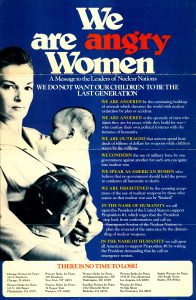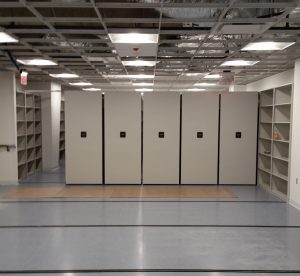Women Strike for Peace (WSP) was founded in 1961 to protest U.S. and Soviet atmospheric nuclear tests. WSP’s motto was “End the Arms Race – Not the Human Race.” Over the years, WSP organized and participated in a variety of peace protests including demonstrating at the nuclear test site in Nevada, a seven-city billboard campaign, and a lobby-by-proxy program.
In the Washington office, WSP’s national legislative coordinator monitored legislation and alerted women when pertinent issues were under discussion and lobbied Congress in support of the Limited Test Ban Treaty and the Comprehensive Test Ban Treaty and in opposition to the Strategic Defense Initiative and other Anti-Ballistic Missile systems.
WSP spearheaded a variety of initiatives including the following: Proposition #1 – A People’s Referendum for Survival (1979); “I refuse to be one of Twenty Million Acceptable Dead” (1982); and “Basic Primer on Star Wars for the Legitimately Confused” (1986). WSP also protested U.S. “intervention” in Southeast Asia, Central America, and the Middle East. WSP was the first group to demonstrate against U.S. involvement in Vietnam.
In response to the proposed Reagan Gorbachev summit in 1985, WSP helped to found Women for a Meaningful Summit that became a network of international women’s organizations working for peace and justice.
American University Library Special Collections holds the historical files of the Washington, D.C. office of Women Strike for Peace that includes a subject file pertaining to issues such as disarmament and nuclear testing, correspondence to and from members of Congress and WSP, and WSP brochures, petitions and publications. Among these materials are brochures and leaflets relating to the activities of other peace organizations in the United States and around the world.

We Are Angry Women 1980




